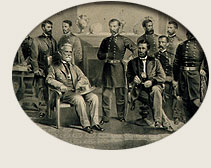|
  he
surrender of Robert E. Lee’s Army of Northern Virginia
to General Ulysses S. Grant on April 9, 1865, at Appomattox
Court House, Virginia, effectively ended the Civil War. The
nation’s return to peace marked the opening of an age
that would raise the United States to new and undreamed of
heights in wealth, productivity, and world influence. But
few could sense that promising destiny then as Union and Confederate
forces laid down their arms for good after four years of bloodshed.
Whatever relief this event inspired was tempered by grieving
on both sides for the great loss of human life the conflict
had brought. In the devastated South, economic recovery seemed
almost insurmountable; in the North, the joy of victory was
quickly overshadowed with the assassination of President Abraham
Lincoln. Yet for the future of the reunited country, the fruit
of victory, as Lincoln had eloquently stated in his second
inaugural address, was the expulsion of slavery once and for
all from the American soil. In this profound sense the war
gave birth to modern America. he
surrender of Robert E. Lee’s Army of Northern Virginia
to General Ulysses S. Grant on April 9, 1865, at Appomattox
Court House, Virginia, effectively ended the Civil War. The
nation’s return to peace marked the opening of an age
that would raise the United States to new and undreamed of
heights in wealth, productivity, and world influence. But
few could sense that promising destiny then as Union and Confederate
forces laid down their arms for good after four years of bloodshed.
Whatever relief this event inspired was tempered by grieving
on both sides for the great loss of human life the conflict
had brought. In the devastated South, economic recovery seemed
almost insurmountable; in the North, the joy of victory was
quickly overshadowed with the assassination of President Abraham
Lincoln. Yet for the future of the reunited country, the fruit
of victory, as Lincoln had eloquently stated in his second
inaugural address, was the expulsion of slavery once and for
all from the American soil. In this profound sense the war
gave birth to modern America.
|

